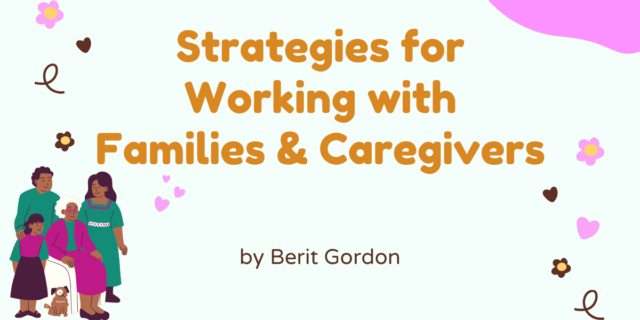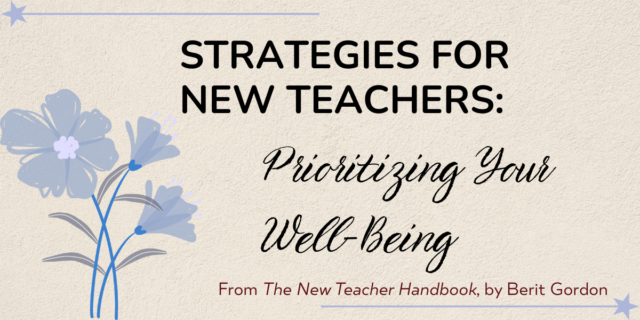
The following is adapted from Berit Gordon’s The Joyful Teacher.
Teaching can be isolating. Most of the people surrounding us are students, not potential support systems. The odds of our success, however, go up the moment we enlist other adults in our teaching lives. Don’t go it alone.
You know you need to find your people when:
- You eat by yourself in your room or stick to your classroom in general for preps and after-school planning.
- You don’t see colleagues outside of school hours.
- You don’t have others’ personal cell phone or email contact info.
- You rely solely on blogs, Twitter, books, and other remote resources to help you plan and figure things out.
Invite colleagues to serve as buddies, mentors, and study partners. It’s possible you’ll find the unicorn who does all of these things at once, but it’s more likely you’ll seek out and enlist different people to serve different roles.
Find and enlist (and by enlist I mean invite with a cup of coffee):
- A buddy. This is someone with whom to carpool, attend school functions, eat lunch, get coffee, and so on. Teaching can take up so much time, and it’s nice when social life sometimes overlaps with work life. Plus, we all need allies in the hard work we do. This is the person you can let your guard down around, who knows your birthday and what you like in your coffee, and who points out you are wearing one blue shoe and one black one.
- A mentor. You might have a mentor or coach designated for you. If so, work to make that relationship helpful by protecting the time, preparing for it with questions and artifacts, and following up on suggestions. Remember that everyone has something to offer us, even if their style is different from ours. If the fit isn’t great, or the mentorship feels more evaluative than energizing, see if you can change it or find an unofficial mentor. In fact, find another anyway! Varied mentorship is important. It’s likely you’ll have many over the span of a healthy teaching career.
- A study partner. Your study partner may also be a buddy or mentor, but it’s not necessary to be best friends or to aspire to be like this person as a teacher. Your study partner will commit to trying things out with you, communicating with you honestly about what’s working and what’s not in their (and your) practice, co-planning toward a common goal (even if not in the same curriculum), debriefing after a conference, or goal setting using this book or other professional resources.
Adaptation for New Teachers
- Give yourself some time to get to know the people in your building. The best teachers might not be immediately obvious. Keep an eye out, listen, and observe.
- Fellow newbies can be a lifeline of support, but they can also be just as overwhelmed as you. Make sure to also seek those who are a stage or two ahead of you.
- Find someone you can trust. Take time to find teachers who refrain from gossip and build up colleagues.
- Take the initiative—seasoned colleagues may be perfectly happy to get to know you.
- Take the risk of asking for help, admitting you need help, and/or simply inviting someone to eat lunch with you.
- Spend time with colleagues by helping them out with something. You might not strike up a friendship with everyone, but you will get a reputation as an open and helpful colleague.
It’s working when:
- You regularly touch base or meet with at least three different people in your building whom you are not mandated to meet with.
- You find yourself saving up questions, challenges, success stories, and/or resources to share with specific people at work.
- When you face a problem, you don’t panic. You know you have avenues for help next door or down the hall.
- For more experienced teachers, you know this is working if you are doing something different this year than last, as a result of a conversation or work with a colleague or mentor/mentee from the previous year.
- When someone new comes to work at your school, you think about what you can offer them in terms of support.
Advice for Experienced Teachers
- Seek out colleagues who continually push your thinking.
- Our lives may be jam-packed with family responsibilities, after-school roles, and/or second jobs. Nurturing relationships takes work, and it may be some of those school relationships have lapsed. Prioritize them so you keep thriving.
- Pay it forward. We all stand on the shoulders of many before us who offered a hug, a hand, or help. Newer teachers need you. They need your open door, your offer to watch their class while they run to the bathroom, your tips for making the copier work, your invite to eat lunch, and, when they’re ready, your professional expertise and personal wisdom. And, who knows, they may just have a new tip up their sleeve to share, too!



